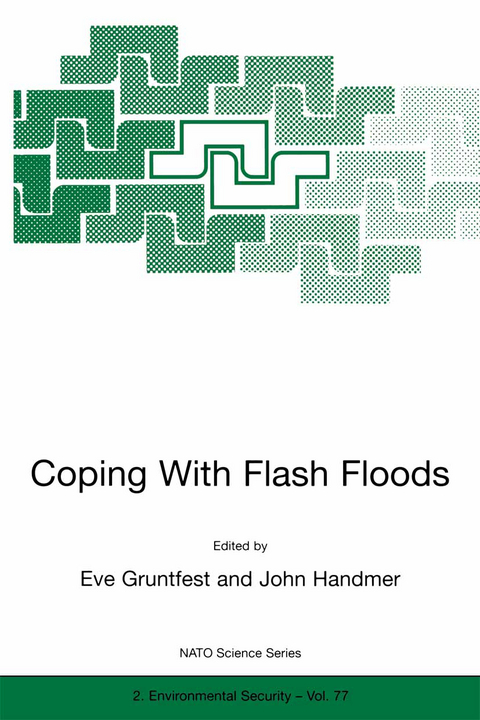
Coping With Flash Floods
Springer (Verlag)
978-0-7923-6825-0 (ISBN)
I: The Problem—Definitions, Vulnerabilities.- Dealing With Flash Floods: Contemporary Issues and Future Possibilities.- Impacts of Flash Floods.- Role of Education in Reducing Flash Flood Effects.- Hydrometeorology of Flash Floods.- GIS and Social Vulnerability Analysis.- Flash Flood Mitigation in Uganda, Equatorial East Africa.- A Study of the Knowledge and Behavior of Brzesko Inhabitants After the Flood in 1997.- Features of Flash Floods Within Plain and Mountain Territory of Ukraine.- A Hydro-Social Modeling Approach for Flash Flooding Alleviation.- II: Managing the Problem- Mitigation.- Warning Systems for Flash Floods: Research Needs, Opportunities and Trends.- Local Flood Hazard Reduction Plans in Poland - Problems and Perspectives.- The Integrated Approach to Flash Flood Management.- The Effectiveness of Engineering Geology in Coping with Flash Floods: A Systems Approach.- Assessing the Effects and Effectiveness of Flash Flood Mitigation Strategies.- III: Managing the Problem- Warnings and Technology.- Overall Experience/System Design.- The Killer Tornado Outbreak of 3 May 1999: Applications of OK-First in Rural Communities.- Revelations from 21 Years of Providing Flash Flood Warning Support in Denver, Colorado.- Beyond Flood Detection: Alternative Applications of Real-Time Data.- Monitoring, Detection, and Prediction.- Hydrometeorological Characteristics of Flash Floods.- Resonance of Scales as a Condition for Flash Floods on a Regional Domain.- A Distributed Hydrological Model of Flash-Floods.- Watershed Modeling with HEC-HMS (Hydrologic Engineering Centers - Hydrologic Modeling System) Using Spatially Distributed Rainfall.- Soil Moisture Observations for Flash Flood Research and Prediction.- Decision-making, Dissemination and Warning.- U.S. Flash FloodWarning Dissemination Via Radio and Television.- Ranking Flash Flood Warnings: A Better Way to Relate Threat to the Public?.- IV: Related Hazards.- Landslide Hazards Associated with Flash-Floods, with Examples from the December 1999 Disaster in Venezuela.- Evaluation of Temporal and Spatial Factors that Control the Susceptibility to Rainfall-Triggered Landslides.- Heavy Rainfall Effects in Mexico During Early October 1999.- V: Where Do We Go From Here ?.- The Flash Flood Laboratory at Colorado State University’s Cooperative Institute for Research in the Atmosphere.- Improved Flash Flood Predictions.- Where We Go From Here: Policy and Research Recommendations.
| Reihe/Serie | NATO Science Partnership Sub-Series: 2 ; 77 |
|---|---|
| Zusatzinfo | 62 Illustrations, black and white; XVIII, 322 p. 62 illus. |
| Verlagsort | Dordrecht |
| Sprache | englisch |
| Maße | 170 x 244 mm |
| Themenwelt | Naturwissenschaften ► Biologie ► Ökologie / Naturschutz |
| Naturwissenschaften ► Geowissenschaften ► Geologie | |
| Naturwissenschaften ► Geowissenschaften ► Hydrologie / Ozeanografie | |
| Naturwissenschaften ► Geowissenschaften ► Meteorologie / Klimatologie | |
| Sozialwissenschaften ► Soziologie | |
| ISBN-10 | 0-7923-6825-8 / 0792368258 |
| ISBN-13 | 978-0-7923-6825-0 / 9780792368250 |
| Zustand | Neuware |
| Haben Sie eine Frage zum Produkt? |
aus dem Bereich


